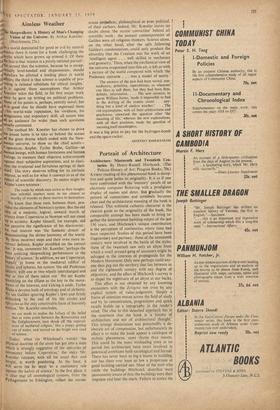Aimless Weather
41E4 Sleepwalkers: A History of Man's Changing in I, Vision of the Universe. By Arthur Koestler. (Hutchinson, 25s.) thehl a world dominated for good or evil by natural ,hdreience there is room for a book challenging the InYths which have grown up around it. Of these r the first is that 'science is a purely rational pursuit'; al the second that the scientist, because he is excep- le tionally level-headed and dispassionate, should o therefore be allotted a leading place in world if affairs; the third is that science is capable of pro- e `'iding 'a rational substitute for ethical insights.' ist it is against these assumptions that Arthur ts,' Koestler takes the field, in his first major work nif since he gave up writing on political problems. II. None of his points is, perhaps, entirely novel; but .11 it-is good that he should have expressed them is hisworld-wide reputation, his vividness, his 3 imaginative and expository skill, all assure him ed of an audience far wider than such questions ur usually command.
hi The method Mr. Koestler has chosen to drive rit his lesson home is to take us behind the scenes it of the great drama which ended with the New-
rii universe, to show us the chief actors-
, r ‘-opernicus, . Kepler, Tycho Brahe, Galileo—as human beings, with human limitations and human failings, to measure their objective achievements against their subjective aspirations, and to eluci- date the irrational and fortuitous springs of their Work. The story deserves telling for its intrinsic interest, as well as for what it conveys to us of the nature of scientific discovery. Its motto might be Kepler's own sentence :
The roads by which men arrive at their insights into celestial matters seem to me almost as worthy of wonder as those matters in themselves.
We know that these men, between them, pro- N'ided the elements of Newton's system. But the old idea of a majestic, logical, onward march of science from Copernicus to Newton will not stand UP to scrutiny. Kepler himself, for example, did not perceive the significance of his discoveries : his real interest was 'the fantastic dream' of demonstrating the divine harmony of the world. 'HY three incorrect steps and their even more in- correct defence, Kepler stumbled on the correct law.' It was, comments Mr. Koestler, 'perhaps the Most amazing sleepwalking performance in the history' of science.' In addition, we see Copernicus, haPpil -at home in the medieval edifice' of circles and spheres, his system 'the old Ptolemaic Pattern, with one or two wheels interchanged and one or .two of them taken out.' We see Kepler stumbling on the ellipse as the key to the move- Merits of the heavens, and kicking it aside, Tycho trahe a devotee both of astrology and of alchemy. We see Galileo ignoring Kepler's laws and firmly defending `to the end of his life circles and epicycles as the only conceivable form of heavenly Motion.' Mr. Koestler concludes, we arc made to realise the fallacy of the belief that at some point between the Renaissance and the Enlightenment, man shook off 'the supersti- tions of mediaeval religion,' like a puppy getting out of water, and started on the bright new road of science.
Today; when (in Whitehead's words) 'the Physical doctrine of the atom has got into a state Which is strongly suggestive of the epicycles of astronomy, before Copernicus,' the story Mr.
Koestler retraces, with all his usual flair and insight, is worth pondering. At the least, it will serve (as he says) 'as a cautionary tale against the hubris of science.' In the first place, it is clear that all cosmological systems, from the Pythagoreans to Eddington, reflect the uncon- scious prejudices, philosophical or even political, of their authors. Indeed, Mr. Koestler leaves no doubt about 'the mystic conviction' behind all scientific work : the pioneer contemporaries of Galileo were all religious thinkers. Science alone, on the other hand, after the split following Galileo's condemnation, could only produce the absurdity that the Creation was the work of an 'intelligent agent . . . well skilled in mechanics and geometry.' Then, when the mechanical view of the universe evaporated into thin air, it left us with a picture of the world compared with which 'the Ptolemaic universe . . . was a model of sanity.'
The answers of the past had been varied, con-
tradictory. primitive, superstitious, or whatever"
one likes to call them, but they had been firm, definite, informative. . . . The new answers, to
quote William James, 'made it impossible to find
in the drifting of the cosmic atoms . . . any-
thing but a kind of aimless weather.' . . . The
old explanations, with all their arbitrariness and patchiness, answered the question after 'the
meaning of life,' whereas the new explanations,
with all their precision, made the question of
meaningitself meaningless.
It was a big price to pay for the hydrogen-bomb and the space-rocket.
GEOFFREY BARR ACLOUGH










































 Previous page
Previous page